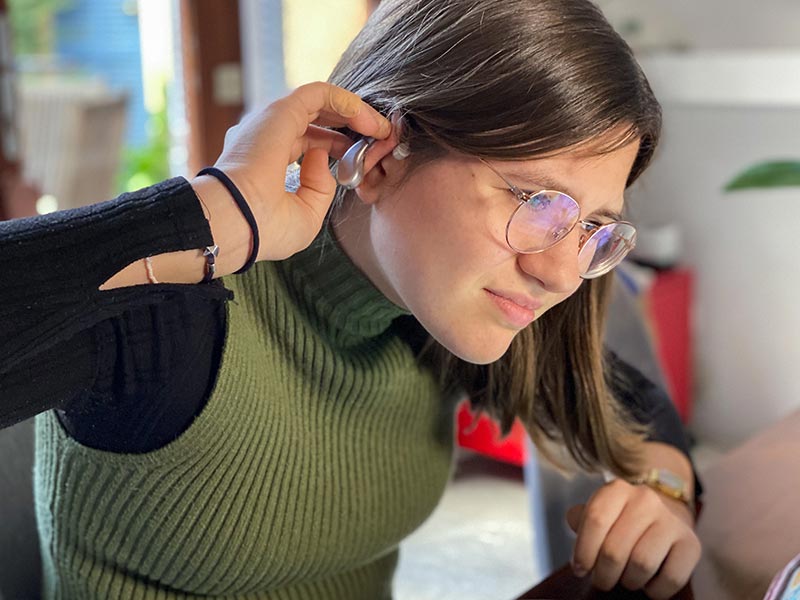Hearing aids are wonderful devices that help many of us with hearing loss continue to communicate with the world around us. However, sometimes these devices can produce an unwanted whistling sound. Many clients come to us and ask why their hearing aids are whistling. In general, hearing aids whistle, due to feedback–and there are three types: acoustic, mechanical, and electronic.

Acoustic Feedback in Hearing Aids
Acoustic feedback occurs when the amplified sound produced by the hearing aid escapes from the ear canal and is picked up by the hearing aid’s microphone. This creates a loop of sound that is amplified and re-amplified, resulting in a high-pitched, whistling or squealing sound that is heard by the wearer of the hearing aid. The most common cause of acoustic feedback is when the hearing aid may not be fitting properly, or if its ear canal has significant wax buildup.
Mechanical Feedback in Hearing Aids
Mechanical feedback in hearing aids is another type of feedback that can occur. It is common for mechanical feedback to occur when the hearing aid or ear mold comes into contact with its own casing, causing vibrations that are picked up by the microphone and amplified as sound. This is what produces a whistling or buzzing sound that is similar to acoustic feedback.
Electronic Feedback in Hearing Aids
Electronic feedback in hearing aids is a third type of feedback that can occur when the sound from the hearing aid is re-amplified or distorted by the electronic components of the hearing aid. Electronic feedback is caused by problematic electrical circuits in the device which means it needs to be looked at and repaired. When electronic feedback occurs, you experience a high-pitched whistling or screeching sound that can be very distracting and uncomfortable.
Top Reasons Why Your Hearing Aid May Be Whistling
- Poor Fit. Poorly fitted hearing aids: Hearing aids that are not properly fitted can allow sound to leak out and cause feedback.
- Earwax buildup. Earwax can accumulate in the ear canal and cause a blockage that can lead to feedback.
- Damage or Malfunction. Hearing aids that are damaged or not functioning properly can produce feedback.
- Excessive volume or gain. If the volume or gain on the hearing aid is set too high, it can cause feedback.
- Loose tubing or wiring. Loose tubing or wiring in the hearing aid can cause sound to leak out and produce feedback.
- Movement or pressure on the hearing aid. Movement or pressure on the hearing aid can cause it to shift or move, allowing sound to leak out and cause feedback.
- Changes in the shape of the ear canal. Changes in the shape of the ear canal due to aging or other factors can affect the fit of the hearing aid and cause feedback.
What Can I Do About My Whistling Hearing Aids
If you are experiencing whistling in your hearing aids, it is important to address the issue as soon as possible to ensure that your hearing aids are functioning properly. It is also recommended that you consult with a hearing healthcare professional who can help you determine the cause and provide a solution. They can help identify the cause of the feedback and recommend solutions, such as adjusting the fit, cleaning the hearing aid, or replacing damaged or malfunctioning components.
Ready to speak with a hearing professional?
Our clinics are here to help! Need help in troubleshooting your whistling hearing aid? We can help identify the cause of the feedback and recommend solutions, such as adjusting the fit, cleaning the hearing aid, or replacing damaged or malfunctioning components. Contact us now!
